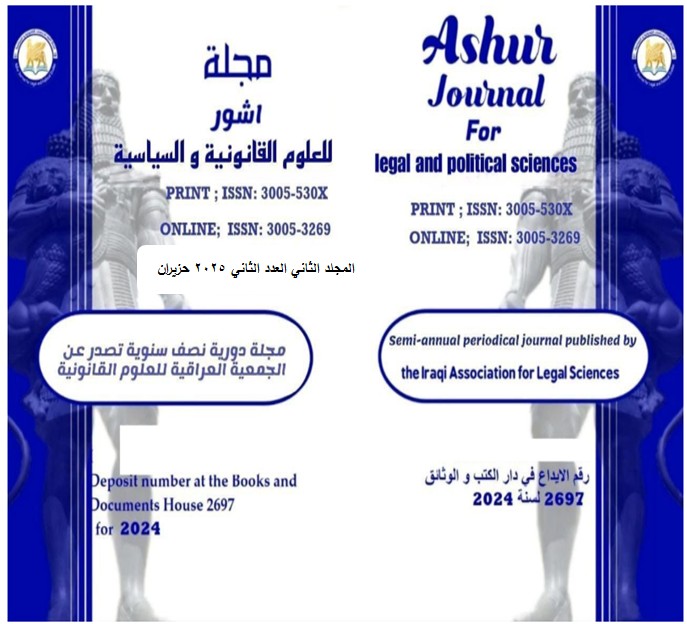الأيديولوجيات الحديثة: التحولات الفكرية وتأثيرها على السياسة العالمية (النظرية النسوية انموذجاً
DOI:
https://doi.org/10.64184/ajlps.V2.I2.Y2025.P174-206.48الكلمات المفتاحية:
الأيديولوجية، النسوية، السياسة العالمية، التقاطعية.الملخص
تُعد النظرية النسوية من الإيديولوجيات المعاصرة التي أحدثت تحولًا عميقًا في الفهم التقليدي للسياسة والعلاقات الاجتماعية، تهدف هذه النظرية إلى تحليل أسباب عدم المساواة بين الجنسين وتسليط الضوء على القضايا التي تؤثر على حياة النساء، وعلى الرغم من أن النسوية بدأت كحركة اجتماعية تسعى لتحسين حقوق المرأة، إلا أنها تطورت لتصبح إطارًا نظريًا واسعًا له تأثير كبير على السياسة العالمية، ففي مجال السياسات العامة، دفعت النظرية النسوية إلى إعادة تصميم السياسات لتصبح أكثر شمولية وعدالة بين الجنسين، مما أدى إلى إصدار تشريعات تعزز حقوق المرأة وتدعم مشاركتها في المجالات السياسية والاقتصادية، وفي العلاقات الدولية، ساهمت النسوية في إعادة تعريف مفاهيم الأمن والسلام، مع التأكيد على أهمية إشراك وجهات نظر النساء في عمليات السلام والمفاوضات الدولية، مما أدى إلى تبني نهج أكثر شمولية في حل النزاعات، أما في المجال الاقتصادي، فقد أبرزت النظرية النسوية أهمية العمل غير المدفوع الأجر الذي تقوم به النساء، ودعت إلى الاعتراف به في الحسابات الاقتصادية الوطنية كما كان لها تأثير واضح في الثقافة والإعلام، اذ ساعدت في تحدي الصور النمطية السائدة وتعزيز الوعي بقضايا النوع الاجتماعي والعدالة، بالإضافة إلى ذلك، أثرت النظرية النسوية على الفكر الأكاديمي والسياسي من خلال تقديم رؤى جديدة حول السلطة والمعرفة، مما وسع نطاق الدراسات السياسية والاجتماعية ليشمل جوانب متنوعة من التجربة الإنسانية.
المراجع
• The Book
1- Ayse Kulahli, Honour Killings in Turkey: Women’s Rights, Feminist Approaches and Domestic Legislation at Crossroads, PhD Thesis (London: 2017).
2- John Levi Martin, WHAT IS IDEOLOGY (University of Chicago: Chicago, Illinois, United States of America,2015).
3- Julie Matthaei, Feminism and Revolution: Looking Back, Looking Ahead, 2018.
4- M.Phil., , Ideologies Meaning & Basic features (BIHAR: MAHTAMA GANDHI CENTRAL UNIVERSITY).
5- Patricia Monture-Angus, FEMINIST INTERSECTIONALITY, (Canada: Women and Gender Equality Canada’s Women’s Program, 2023).
6- Penny A. Pasque,and Brenton Wimmer, An Introduction:Feminist Perspectives(United States: University of Oklahoma,2011).
7- Tucker, Ericka, Michael Gibbons (ed.), Feminist Political Theory(New York: Encyclopedia of Political Thought, 2011).
8- William Clare Roberta, Ideology(California : Stanford Encyclopedia of Philosophy Copyright by the publisher The Metaphysica Research Lab Department of Philosophy Stanford University, Stanford, 2025).
• Journal Article
1- ) Stacy Gillis, Rebecca Munford, Introduction: Harvesting our Strengths: Third Wave Feminism and Wome,s Studie, Journal of International Women's Studies, Vol. 4, no. 2 (USA: Massachusetts Institute of Technology, 2003).
2- ) ( Mohajan Haradhan, Four Waves of Feminism: A Blessing for Global Humanity, Studies in Social Science & Humanities, VOL.1, NO.2 (Bangladesh: 2022).
3- Babulal Bala, Origin and Development of Feminism in Historical Perspectives, Journal of Historical Studies and Research, Volume 2, Number 1(2022).
4- JETIR, Journal of Emerging Technologies and Innovative Research, Volume 6, Issue 5, 2019.
5- Negar Shiva, Zohreh Nosrat Kharazmi, The Fourth Wave of Feminism and the Lack of Social Realism in Cyberspace, Journal of Cyberspace Studies, Vol 3, No. 2(Tehran: 2019).
6- R. Claire Snyder, What Is Third‐Wave Feminism? A New Directions Essay, Signs: Journal of Women in Culture and Society, vol. 34, no. 1 (The University of Chicago Press: 2008).
7- Shresth Vardhan, THIRD WAVE FEMINISM – A CRITICAL ANALYSIS, SOUTH ASIAN LAW REVIEW JOURNAL, VOLUME 1, No3,( South Asian: Nirma University, JUNE 2017).
التنزيلات
منشور
إصدار
القسم
الرخصة
يحتفظ المؤلفون بحقوق الطبع والنشر الكاملة لمقالهم المنشور.
تُطبّق مجلة آشور للعلوم القانونية والسياسية (AJLPS) رخصة المشاع الإبداعي المنسوبة 4.0 الدولية (CC BY 4.0) على مقالاتنا وأعمالنا الأخرى. إذا أرسلتَ بحثك للنشر من قِبل AJLPS، فإنك تُوافق على تطبيق رخصة CC BY 4.0 على عملك.
يمكن قراءة المقالات ومشاركتها وفقًا للشروط التالية:
النسبة: يجب أن تُنسب إلى المصدر الأصلي (Attribution).
التفاصيل الكاملة متوفرة على الرابط:
https://creativecommons.org/licenses/by/4.0/






